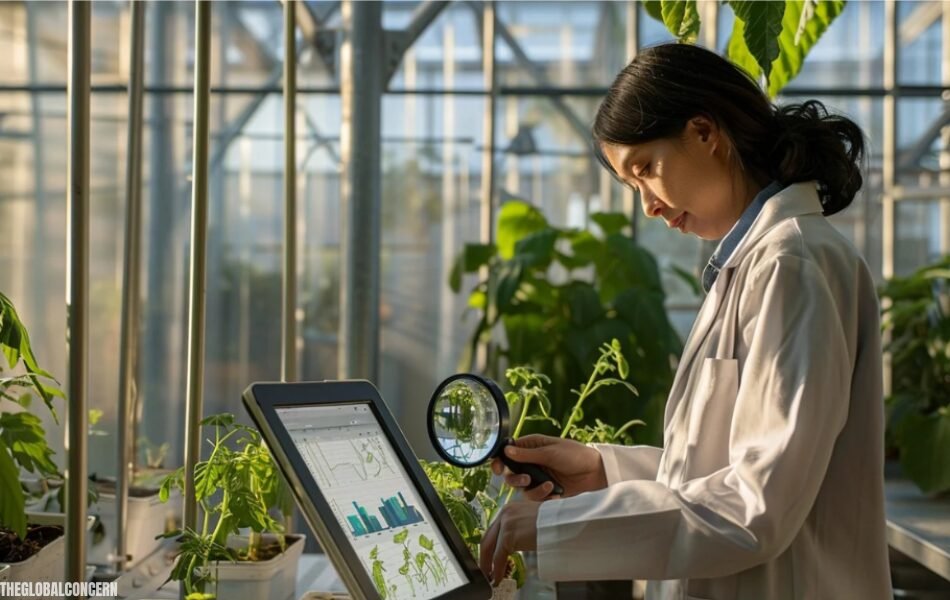Cole Tuckey on Rye Janet: Revolutionary Breakthrough

Imagine a world where crops can withstand harsh climates, resist pests, and yield bountiful harvests. This vision is becoming a reality, thanks to the groundbreaking research of scientists like Cole Tuckey. Tuckey’s work on rye Janet, a specific variety of rye, has the potential to revolutionize agriculture and address global food security challenges.
Cole Tuckey on rye janet is a renowned plant geneticist and a leading figure in the field of agricultural research. With a deep understanding of plant genetics and a passion for innovation, Tuckey has made significant contributions to the development of more resilient and productive crops.
Rye Janet is a unique variety of rye that possesses exceptional traits, such as disease resistance, drought tolerance, and high nutritional value. Tuckey’s research has focused on unlocking the genetic potential of rye Janet to develop new crop varieties that can thrive in diverse environments and provide sustainable food sources.
By studying the genetic makeup of rye Janet, Tuckey and his team have identified specific genes responsible for these desirable traits. This knowledge allows scientists to manipulate the genetic code of other crops, such as wheat and barley, to incorporate these beneficial characteristics.
The implications of this research are far-reaching. By developing more resilient and productive crop varieties, we can reduce our reliance on chemical pesticides and fertilizers, minimize environmental impact, and ensure food security for future generations.
Diving Deeper into Tuckey’s Rye Janet Research
Cole Tuckey’s research on rye Janet has delved into the intricate details of its genetic makeup. By sequencing the rye Janet genome, Tuckey’s team has identified specific genes responsible for traits like disease resistance, drought tolerance, and high yield potential. This groundbreaking research has opened up new avenues for genetic engineering and crop improvement.
One of the most significant discoveries from Tuckey’s research is the identification of a gene cluster that confers broad-spectrum disease resistance in rye Janet. By understanding the molecular mechanisms underlying this resistance, scientists can develop strategies to engineer disease-resistant varieties of other crops.
Additionally, Tuckey’s team has identified genes associated with increased yield and improved grain quality in rye Janet. By manipulating these genes, it may be possible to develop higher-yielding and more nutritious varieties of wheat, barley, and other cereal crops.
The implications of Tuckey’s research for agriculture are far-reaching. By developing more resilient and productive crop varieties, we can reduce our reliance on chemical inputs, conserve water resources, and mitigate the effects of climate change on agriculture.
Moreover, these advancements can help to address food security challenges in developing countries, where smallholder farmers often struggle to produce enough food to feed their families. By providing farmers with access to improved seed varieties, we can empower them to increase their yields and improve their livelihoods.
Rye Janet: A Nutritional Powerhouse
Rye Janet is not only a resilient crop but also a nutritional powerhouse. It is rich in dietary fiber, vitamins, and minerals, making it a valuable addition to a healthy diet. The high fiber content of rye Janet can aid in digestion, promote satiety, and help regulate blood sugar levels. Additionally, it contains essential vitamins and minerals, such as iron, zinc, and B vitamins, which are crucial for overall health and well-being.
Beyond its nutritional benefits, rye Janet is also a versatile ingredient that can be used in a variety of culinary applications. Rye flour, made from rye Janet grains, can be used to bake bread, pastries, and other baked goods. Rye flour imparts a distinctive flavor and texture to baked goods, making them more flavorful and nutritious.
Moreover, rye Janet grains can be cooked and eaten as a whole grain, similar to rice or quinoa. They can be added to soups, stews, and salads, or enjoyed as a side dish.
Rye Janet’s resilience to various environmental stresses, such as drought and pests, makes it an ideal crop for sustainable agriculture. By cultivating rye Janet, farmers can reduce their reliance on chemical pesticides and fertilizers, minimizing their environmental impact.
Furthermore, the high nutritional value of Cole Tuckey on rye janet can help address global food security concerns. As the world population continues to grow, there is an increasing demand for food. By developing more productive and resilient crop varieties, such as rye Janet, we can ensure that future generations have access to nutritious and affordable food.
The Future of Rye Janet: A Glimpse into the Horizon
The field of rye Janet research is constantly evolving. Scientists around the world are exploring new avenues to unlock the full potential of this remarkable crop. Ongoing research focuses on identifying additional genes that contribute to desirable traits, such as improved stress tolerance, enhanced nutritional value, and increased yield. By understanding the genetic basis of these traits, researchers can develop more precise breeding strategies to create superior rye Janet varieties.
The commercialization of rye Janet-based products has the potential to revolutionize the food industry. Rye flour, made from rye Janet grains, can be used to produce a wide range of products, including bread, pasta, and cereals. Additionally, rye Janet can be used as a feedstock for biofuels, contributing to a more sustainable energy future.
The economic impact of Cole Tuckey on rye janet commercialization could be significant. Increased demand for rye Janet-based products could lead to job creation in rural areas, boost the agricultural economy, and generate revenue for farmers and businesses.
While the potential benefits of rye Janet are substantial, it is essential to consider the ethical implications of genetic engineering. Some people raise concerns about the long-term environmental impact of genetically modified crops and their potential to harm biodiversity. Additionally, there are concerns about the safety of consuming genetically modified foods.
To address these concerns, it is crucial to conduct rigorous scientific research and safety assessments. Transparent labeling of genetically modified products can also help consumers make informed choices. By engaging in open dialogue and addressing public concerns, we can ensure that the development and use of genetically modified crops, such as rye Janet, are conducted responsibly and ethically.
Conclusion: Cole Tuckey on Rye Janet
Cole Tuckey’s groundbreaking research Cole Tuckey on rye janet has illuminated a path toward a more sustainable and food-secure future. By unraveling the genetic secrets of this remarkable crop, Tuckey and his team have laid the foundation for the development of more resilient, productive, and nutritious crop varieties.
As we look to the future, the potential of rye Janet is truly exciting. With continued research and innovation, we can unlock even greater benefits for agriculture and human health. By embracing sustainable farming practices and supporting the development of innovative crops like rye Janet, we can ensure a thriving planet for generations to come.
To learn more about Cole Tuckey on rye janet and its potential to transform agriculture, consider exploring the work of Cole Tuckey on rye janet and other researchers in the field of plant genetics. Support sustainable agriculture by choosing locally sourced, organic products and reducing food waste. Embrace innovative food options that incorporate rye Janet and other nutritious grains. Together, we can create a more sustainable and food-secure future.
FAQs: Cole Tuckey on Rye Janet
Q: Who is Cole Tuckey on rye janet and why is their research on rye Janet significant?
A: Cole Tuckey on rye janet is a renowned plant geneticist whose research on rye Janet has the potential to revolutionize agriculture. Rye Janet is a unique variety of rye with exceptional traits like disease resistance, drought tolerance, and high nutritional value. Tuckey’s research aims to unlock the genetic potential of rye Janet to develop more resilient and productive crop varieties.
Q: What are the key findings and breakthroughs from Tuckey’s research on rye Janet?
A: Tuckey’s research has led to several significant discoveries, including the identification of genes responsible for disease resistance, drought tolerance, and high yield potential in rye Janet. By understanding the genetic basis of these traits, scientists can develop strategies to improve other crop varieties.
Q: How can rye Janet contribute to food security and sustainability?
A: Rye Janet’s resilience to various environmental stresses makes it a valuable crop for sustainable agriculture. By cultivating rye Janet, farmers can reduce their reliance on chemical inputs and conserve water resources. Additionally, the high nutritional value of rye Janet can help address global food security concerns by providing a nutritious and sustainable food source.
Q: What are the potential applications and commercialization of rye Janet?
A: Rye Janet-based products, such as rye flour, can be used to produce a wide range of foods, including bread, pasta, and cereals. The commercialization of rye Janet has the potential to boost the agricultural economy and create jobs. However, it is essential to address ethical concerns and ensure the responsible use of genetic engineering technologies.








